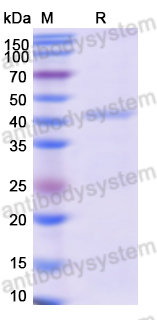Catalog No.
YHB89601
Expression system
E. coli
Species
Homo sapiens (Human)
Protein length
Lys235-Arg394
Predicted molecular weight
44.91 kDa
Nature
Recombinant
Endotoxin level
Please contact with the lab for this information.
Purity
>90% as determined by SDS-PAGE.
Accession
P01011
Applications
ELISA, Immunogen, SDS-PAGE, WB, Bioactivity testing in progress
Form
Lyophilized
Storage buffer
Lyophilized from a solution in PBS pH 7.4, 0.02% NLS, 1mM EDTA, 4% Trehalose, 1% Mannitol.
Reconstitution
Reconstitute in sterile water for a stock solution. A copy of datasheet will be provided with the products, please refer to it for details.
Shipping
In general, proteins are provided as lyophilized powder/frozen liquid. They are shipped out with dry ice/blue ice unless customers require otherwise.
Stability and Storage
Use a manual defrost freezer and avoid repeated freeze thaw cycles. Store at 2 to 8°C for frequent use. Store at -20 to -80°C for twelve months from the date of receipt.
Alternative Names
Cell growth-inhibiting gene 24/25 protein, ACT, Serpin A3, Alpha-1-antichymotrypsin, SERPINA3, AACT
Neuroinflammation Markers in Tear Fluid of Mild Alzheimer's Disease., PMID:40471493
SERPINA3 is expressed in human adipocytes and modulated by TNF-α and vitamin B6., PMID:40425899
Exploring the impact of SerpinA3n deficiency on prion strains propagation., PMID:40425129
Unveiling the levels and significance of different serpin family proteins in aqueous humor dynamics., PMID:40389884
Overexpression of SERPINA3 inhibits castration-resistant prostate cancer progression by enhancing M1 macrophage recruitment via CXCL2 upregulation., PMID:40367014
Identification of a Biomarker Panel in Extracellular Vesicles Derived From Non-Small Cell Lung Cancer (NSCLC) Through Proteomic Analysis and Machine Learning., PMID:40366616
Transcriptional evidence of reduced BDNF trophic capacity in the post-mortem human midbrain of schizophrenia cases with high inflammation., PMID:40335479
Combining Mass Spectrometry with Machine Learning to Identify Novel Protein Signatures: The Example of Multisystem Inflammatory Syndrome in Children., PMID:40313298
SAA1 Protein: A Potential Biomarker for Acute Myeloid Leukemia., PMID:40299483
Role of SerpinA3 in the Pathogenesis of Graves' Orbitopathy in Orbital Fibroblasts., PMID:40202736
Identification of noval diagnostic biomarker for HFpEF based on proteomics and machine learning., PMID:40200297
Prediction of influenza virus infection based on deep learning and peripheral blood proteomics: A diagnostic study., PMID:40158620
SERPINA3 predicts long-term neurological outcomes and mortality in patients with intracerebral hemorrhage., PMID:40157917
SERPINA3: A Novel Therapeutic Target for Diabetes-Related Cognitive Impairment Identified Through Integrated Machine Learning and Molecular Docking Analysis., PMID:40076571
Biological signatures in the Alzheimer's continuum discriminate between diagnosis-related and -unrelated associations to ATN categories., PMID:40046342
Proteome-wide Mendelian randomization identifies causal plasma proteins in prostate cancer development., PMID:39994764
Nur77 Promotes Inflammation in Cisplatin-Induced Acute Kidney Injury Through Transactivation of SERPINA3 Mediating Wnt/β-Catenin Pathway., PMID:39957271
Sex-related differences in the prognostic utility of inflammatory and thrombotic cardiovascular risk markers in patients with chest pain of suspected coronary origin., PMID:39897419
Plasma proteome fingerprint in kidney diseases., PMID:39896931
Evaluation of plasma alpha-1-antichymotrypsin as a marker for pulmonary Kaposi sarcoma., PMID:39887999
LYVE1 and IL1RL1 are mitochondrial permeability transition-driven necrosis-related genes in heart failure., PMID:39870162
Serpina3k lactylation protects from cardiac ischemia reperfusion injury., PMID:39856050
New insight into the role of the pathway NLRP1 and NLRP3 inflammasomes and IL-33 in ultraviolet-induced cutaneous carcinogenesis., PMID:39839625
Tandem duplication of serpin genes yields functional variation and snake venom inhibitors., PMID:39829938
Exploring SERPINA3 as a neuroinflammatory modulator in Alzheimer's disease with sex and regional brain variations., PMID:39754632
Updated genetic background of generalized pustular psoriasis as an autoinflammatory keratinization disease., PMID:39698752
Spatial Transcriptomic Analysis Identifies a SERPINA3-Expressing Astrocytic State Associated with the Human Neuritic Plaque Microenvironment., PMID:39605680
Infectious parvovirus B19 circulates in the blood coated with active host protease inhibitors., PMID:39500886
Dispensable regulation of brain development and myelination by the immune-related protein Serpina3n., PMID:39450611
Deciphering Proteomic Expression in Inflammatory Disorders: A Mass Spectrometry Exploration Comparing Infectious, Noninfectious, and Traumatic Brain Injuries in Human Cerebrospinal Fluid., PMID:39391051
Reactive astrocytes generated from human iPSC are pro-inflammatory and display altered metabolism., PMID:39357593
Cancer Development and Progression in Patients with Heart Failure., PMID:39340596
Targeted MRM-analysis of plasma proteins in frozen whole blood samples from patients with COVID-19: a retrospective study., PMID:39321553
PARD6A promotes lung adenocarcinoma cell proliferation and invasion through Serpina3., PMID:39300216
LncRNA SNHG1 facilitates colorectal cancer cells metastasis by recruiting HNRNPD protein to stabilize SERPINA3 mRNA., PMID:39233042
Integrated Bioinformatics-Based Identification and Validation of Neuroinflammation-Related Hub Genes in Primary Open-Angle Glaucoma., PMID:39125762
SERPINA3 is a marker of cartilage differentiation and is essential for the expression of extracellular matrix genes during early chondrogenesis., PMID:39097037
Methazolamide Can Treat Atherosclerosis by Increasing Immunosuppressive Cells and Decreasing Expressions of Genes Related to Proinflammation, Calcification, and Tissue Remodeling., PMID:39081633
Comparative Proteomic Profiling of Blood Plasma Revealed Marker Proteins Involved in Temporal Lobe Epilepsy., PMID:39063177
Investigating the molecular mechanisms underlying the co-occurrence of Parkinson's disease and inflammatory bowel disease through the integration of multiple datasets., PMID:39043798
Application of Proteomics and Machine Learning Methods to Study the Pathogenesis of Diabetic Nephropathy and Screen Urinary Biomarkers., PMID:38949094
Conjugated linoleic acid (CLA) modulates bovine peripheral blood mononuclear cells (PBMC) proteome in vitro., PMID:38909954
Characterization of systolic and diastolic function, alongside proteomic profiling, in doxorubicin-induced cardiovascular toxicity in mice., PMID:38909263
The role of the immune system in depersonalisation disorder., PMID:38679810
Serine protease inhibitor, SerpinA3n, regulates cardiac remodelling after myocardial infarction., PMID:38666458
Genetic analysis of different subtypes of aseptic pustulosis in the Chinese population., PMID:38651209
Regulation of CNS pathology by Serpina3n/SERPINA3: The knowns and the puzzles., PMID:38647003
SERPINA3, FGA, AGP1, ITIH3 and SAA1 as novel biomarkers for eosinophilic granulomatosis with polyangiitis diagnosis and activity assessment., PMID:38552326
Identification of circadian rhythm-related gene classification patterns and immune infiltration analysis in heart failure based on machine learning., PMID:38509983
Connecting single-nucleotide polymorphisms, glycosylation status, and interactions of plasma serine protease inhibitors., PMID:38455847

